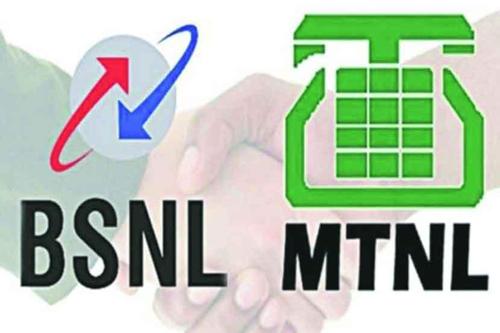BSNL-MTNL Revival Plan: Enough to Stop Bleeding?

Image Courtesy: HilltopMonitor
On October 23, the Modi government finally woke up to the demands of the employees of the state-owned telecom companies Mahanagar Telephone Nigam Limited (MTNL) and Bharat Sanchar Nigam Limited (BSNL). The government has decided to merge the sister companies as part of a revival package, which includes administrative allotment of spectrum of 4G services, debt restructuring by raising bonds with sovereign guarantee, reducing employee costs, and monetisation of assets.
The announcement made by Union Minister for Communications Ravi Shankar Prasad met with mixed reactions from the employees’ unions of the two companies. While some decisions were the long pending demands of the employees’ fronts, others were unwarranted and thus, set off alarm bells among the staff.
At the outset, as per the union leaders, the Rs. 70,000-crore relief package sent a positive message to the market. The share prices of MTNL were up by 5% on the following day, Business Standard reported. The announcements will have its effects in advancing the confidence of the banks, in providing loans to the financially stressed entities. Above all, the plan is said to have boosted the morale of the lakhs of employee.
However, the other side of the coin casts a different dull altogether. With operations being marred with thousands of crores of accumulated losses and private players like Reliance Jio set to monopolise the market—thanks to the political patronage—has the relief package came too late? Will it only stop the bleeding in the short run or be effective in healing the wound? It is hard to predict.
Abhimanyu P, General Secretary of BSNL Employees’ Union, also believes so. Though being optimistic regarding the relief package, Abhimanyu recorded his disagreement over the narrative followed by the minister in his press briefing explaining the financial distress of the public sector unit.
“To say BSNL has gone into losses because of its huge workforce is not a correct argument,” Abhimanyu told NewsClick, “BSNL earned a net profit of Rs. 10,000 crore in 2004-05, when the company was having one lakh employees—more than what it is having today.”
He further provided an explanation to the mounting losses. According to him, the government-owned entity was never fielded on a level playing ground with the private players. “From 2006 to 2012, for six years, telecom equipments were not procured and expansion of the company was restricted.” What’s more, when in 2013 it was allowed to place tenders for procuring the equipment, the company was tied up in the “procedural wrangling” of the bureaucracy.
To rescue the telecom companies now, the Modi government has planned to monetise assets worth Rs 38,000 crore in the next four years. Conversely, according to Abhimanyu, the BSNL management proposed to rent out or lease out the land, which, as per estimates, could have fetched Rs 10,000 crore each year, instead of putting the land up for sale.
Moreover, the turnaround plan includes introduction of Voluntary Retirement Scheme (VRS) to cut the manpower costs of the two companies. Sebastin K, General Secretary of Sanchar Nigam Executive’s Association (SNEA), believes this would lead to massive outsourcing of the jobs within the two government owned units. “There are well over 75,000 contact workers who are engaged to keep the BSNL service running,” Sebastin said, “these workers maintain broadband services, marketing, cable and line maintenance among other things, and they have not been paid their wages for last eight to 10 months.”
In the name of cutting costs, the government is set to force the public telecom companies to advance contractualisation of the workforce, he added.
NewsClick also spoke to K R Yadav, general secretary of Telecom Executives’ Association of MTNL. According to him, no high hopes are attached with the recently announced revival package. “The administrative nature of both the companies is different,” he explained, “MTNL is a listed company, while BSNL is not.” “To carry out the merger, the government will have to buy back the shares of MTNL which will easily take two to three years.”
According to him, the MTNL employees have not received their September salaries yet. The salaries for the month of August were disbursed only today, a day after the rescue plan was announced. “The companies might be afloat for the time being, but in the long run, revival won’t be easy,” he added.
Incidentally, a Times of India report had quoted Union Minister Prasad as saying that the government is confident that the two companies will be operationally profitable over the next years, and may become fully profitable by the year 2023.
“Eventually, it’s the privatisation of the public telecom companies which is in pipeline,” a person in the know told NewsClick, “the two companies will be rescued first and then soon be up for grab for private players.” “This is what has been going on with Air India, under Modi and that will be the fate of BSNL and MTNL.”
Get the latest reports & analysis with people's perspective on Protests, movements & deep analytical videos, discussions of the current affairs in your Telegram app. Subscribe to NewsClick's Telegram channel & get Real-Time updates on stories, as they get published on our website.
























